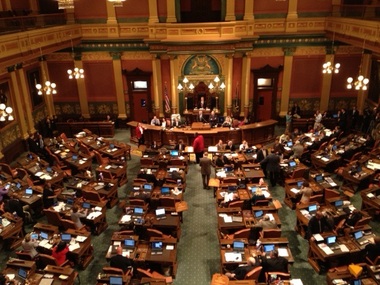AARP Eye Center

LANSING - A plan to expand Medicaid under the federal law commonly known as Obamacare advanced Thursday in the Michigan House, despite division among Republicans who hold the majority in the chamber.
House Bill 4714 – if it becomes law – eventually could make more than 400,000 additional low-income adults eligible for the government health insurance program. Medicaid already covers roughly one in five Michigan residents.
The bill was approved by a 76-31 vote in the House. The Republican vote was split, while Democrats generally supported the bill. Democrats broke out in applause after the bill was passed.
AARP Michigan strongly supports House Bill 4714.
The bill next advances to the Republican-led Senate. Republican Gov. Rick Snyder wants the bill approved before lawmakers break for the summer, which could be at the end of next week.
Snyder called the House vote "a fiscally responsible, forward-looking move that puts our state on a healthier course."
The Obama administration would have to approve waivers for the plan to kick in. That’s because the Michigan plan would tie the expansion to certain reforms within the Medicaid system that supporters say are aimed at boosting the overall health of the population and requiring some participants to cover more of the program’s costs over time.
Some Republicans who say they don’t like Obamacare – officially, the federal Affordable Care Act – voted for the Medicaid expansion anyway.
Rep. Mike Shirkey, R-Clarklake, said he went from a “hard no” to a “yes” on the issue as it moved through the process. He said “despite the distastefulness of being even remotely associated” with a federal program he didn’t like, “the opportunities for us to seize control of how Michigan defines our Medicaid system significantly outweigh the philosophical opposition.”
“I believe it’s time for us to stop playing defense with something that is the law of the land, and begin to play offense," Shirkey said.
Rep. Pete Lund, R-Shelby Township, voted against the proposal.
"For me, I just looked at it as too much of an expansion of government – even though there were some very good things in the bill," Lund said. "There were some good reforms that I thought were a step in the right direction. If I could have voted for the reforms without the expansion, I would have. But you can’t."
Rep. Brandon Dillon, D-Grand Rapids, supported the bill. He called Thursday the “first day I’ve been really proud to be a representative in this state.”
“This isn’t just a philosophical argument about the size and scope of government,” Dillon said. "This is a bill that will immediately impact people in a very positive way."
The bill would allow the expansion of Medicaid to adults making up to 133 percent of the poverty level. The federal government is saying it would cover the entire cost through 2016, but the support would ramp down to 90 percent over time.
Lawmakers have been pressured from both supporters and opponents of the expansion.
Supporters say offering coverage to more low-income people will make them healthier and cut down on expensive trips to hospital emergency rooms. Supporters say they could help improve health and save money over the long haul.
But opponents, including some tea party members, criticize the expansion of a government program. They also say there’s no guarantee the federal government will cover the costs they say it will.
A group of tea party activists this week said they won’t support Snyder’s re-election effort because of his support for Medicaid expansion. It’s possible some lawmakers that support the expansion could lose tea party backing as well.
The Michigan plan could add an estimated 320,000 residents to Medicaid rolls in 2014, with the number growing to 470,000 by 2021. It would significantly reduce the number of uninsured people in the state.
The House Republican proposal no longer includes a strict, 48-month time limit on receiving Medicaid benefits for able-bodied adults – a clause that likely would not have won a waiver from the federal government. Instead, many of the adults added through the expansion would have two options after four years. They could buy government-subsidized insurance through the planned federal health insurance exchange, or they could remain on Medicaid by paying more out-of-pocket costs.
Some elements of the original House Republican proposal have not changed. It still gives recipients opportunities to lower their premiums and co-pays by not smoking, losing weight or taking other steps aimed at improving health. Some program participants could use health savings accounts in connection with private plans.
From MLive























































